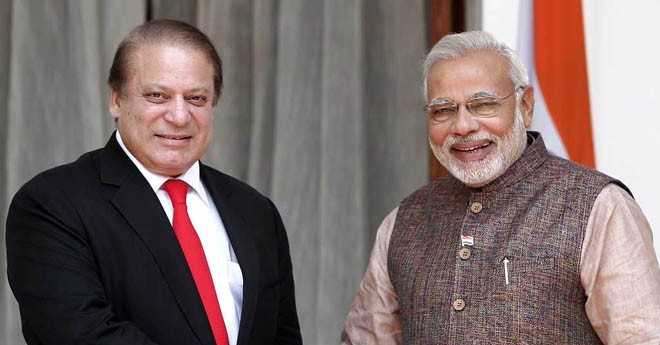
Both Pakistan and India will have to show political maturity and foresight to scuttle attempts to defeat normalisation of relations

While the capital has been observing a deadlock on the political front, our foreign policy is also victim of another deadlock -- cancellation of foreign secretary level talks between India and Pakistan. After the Prime Minister of Pakistan’s participation in Prime Minister Modi’s oath-taking ceremony and reflection of mutual goodwill gestures at personal level, it was hoped that the relations between two neighbours would not further deteriorate -- if don’t improve.
The progress on Indo-Pak relations during Nawaz-Vajpayee governments in late nineties led to the assumption that "right to the centre" parties at the helm of affairs in India and Pakistan can actually help in improving the relations as their presumably to the centre" opposition parties would not be a major stumbling block in normalisation of bilateral relations.
Moreover, after the presence of two "pro-business" premiers on both sides of the border, there was optimism in the air and different circles were talking about grant of "non-discriminatory market access" (NDMA) to India; feasibility for energy trade between both countries; and the enthusiasm to revive SAARC. It was also hoped that composite dialogue would be resumed and a foreign secretary level meeting was scheduled in Islamabad on 25th August.
However, the optimism faded away and the talks got suspended, not due to the ongoing dharnas in Islamabad, but due to a meeting between Pakistani High Commissioner and Kashmiri Hurriyat leader.
Pakistan justifies this meeting as a routine discussion with Kashmiri leadership before any Indo-Pak talks where Kashmir is an agenda point, whereas India perceives that meeting as Pakistan’s interference in its domestic affairs. Even if this meeting had not taken place, the cross-border firing and accusation of boundary line violation on both sides had been staining the proposed dialogues.
In other words, we are again inching back to square one. It would also have negative effect on the forthcoming SAARC heads of state/government summit in November. One should not have high hopes from that summit which may be still another photo op opportunity, i.e., business as usual.
It is a pity that the region is held hostage by the two largest economies which comprises 90 per cent of South Asia’s GDP, more than 80 per cent of the region’s US$ 28 billion intra-regional trade (not the bilateral trade) and 86 per cent of population.
However, we must also keep in mind that Indo-Pak relations are always unpredictable and volatile. They cannot live without each other and they cannot live together.
There are two Indias: shinning India and the suffering India. Despite the fact that a large number of Indian population suffers from poverty and low social development, it is working for a new economic world order along with China, Russia, Brazil, and South Africa. The "parallel" World Bank, "New Development Bank" also known as BRICS Bank is one such concrete step. It has also got the clearance from United States to be a permanent member of UN Security Council.
Pakistan, on the other hand, though sandwiched between two giants -- India and China -- is still a very important consumer market. It is world’s 6th most populous country with a growing urban middle class and is very soon to overtake Brazil to be the 5th populous country.
Besides being an important consumer market, it is an important regional actor, too. It is commonly perceived that a prerequisite to a stable South Asia is a stable Pakistan. Pakistan would not be able to pay proper attention to the western borders until it has complete peace on its eastern borders, something which requires bridging of trust deficit from both sides.
On top of it, there is a strong case of welfare gain for the consumers, a strong case of collaborative efforts for common challenges facing the region, such as climate change, poverty alleviation, and food insecurity.
So what is the way forward?
Here is a strong case of mutual co-existence both within and across the border. Both the countries would have to learn to agree to disagree in an amicable way and continuity of dialogue is a must for that. Whereas the dialogues would be useless until their output is owned by all stakeholders, including powerful establishments on both sides. Thus, the challenge is multifaceted and extremely complicated.
The will from both sides to bring in permanent peace between the two countries cannot materialise unless there is stability of institutions at home; Pakistan is a case in point at the moment. Only continuity of democracy in both the countries -- especially Pakistan in the present scenario -- can promise the fruits of regional peace and economic prosperity for not just Pakistan but the entire region, including Afghanistan, in the foreseeable future.